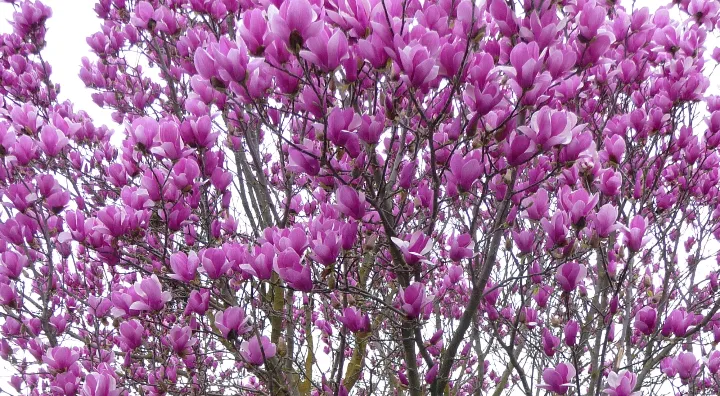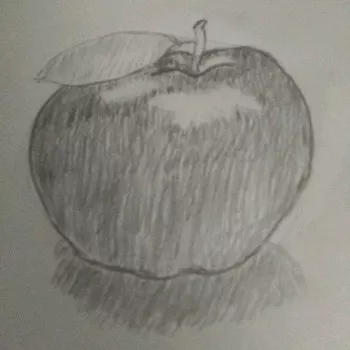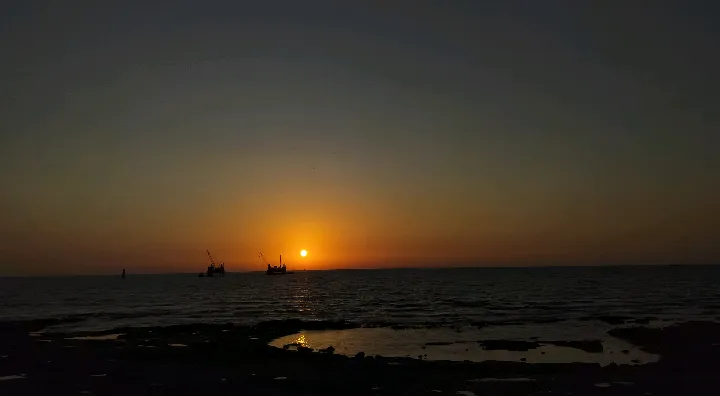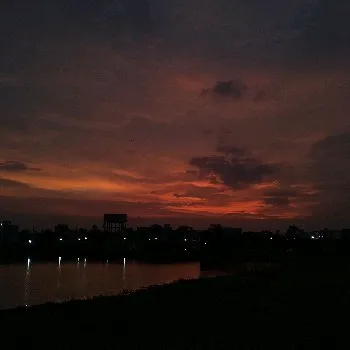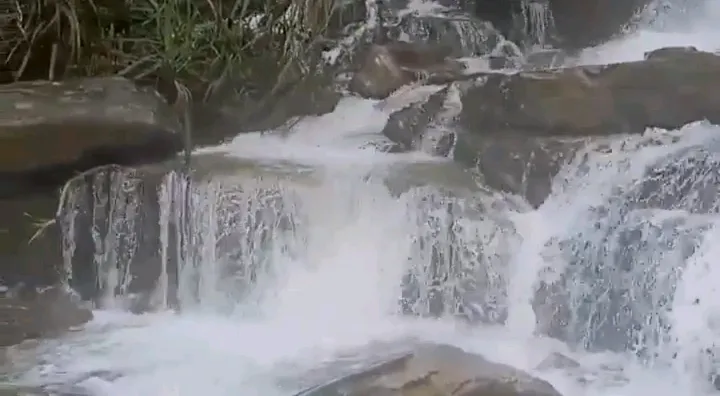Ballad Of A Honey Tree
I don't know where the bees came from, or why they chose the tulip tree, but high up in the branches was their nest. It was always hot in this part of Africa, and they never wanted for anything. The surrounding fields were covered in beautiful flowers and their hives thrived and flourished. And where they excelled in their production in the hot sun of Africa's daytime's, the honey would trickle down the trunk. Around the base of the tulip tree many insects and animals came to enjoy the lovely feast. Nature was bountiful, and the harvest always pleasant and fruitful so that every creature found harmony. With every beast came the cycle of waste, and the soil became fertile with their droppings and the vegetation too was healthy and strong. The tree itself grew to its maximum potential and stood out against the landscape of rivers and rolling hills.
But alas, the day came when a new creature spotted the tulip tree and its magnificent blooms. Man entered the valley that housed all he could wish for, including game to eat and herbs for cooking and healing. The valley was something special and sacred to him in the early days, and for a time the balance was maintained. But within a few decades man had multiplied and their needs had grown more complex and bigger. With more mouths to feed Man had to hunt and clothe his pack, and soon the creatures nearest him started to dwindle. He grew guarded as other tribes started to encroach on his lovely valley. Now he not only hunted, but he guarded too, and he started to build a homeship that he could defend. Yet a sort of balance was maintained as his numbers were not yet too great to cause a huge disturbance. The tulip tree still ran with the honey and looked golden in the sunlight, as if the bark were made of amber.
Soon however, the game that man sought grew wary of Man, and it started to migrate through the valley and on to safer lands. Man had to trek further to reach his prey, or else the lazier amongst them found new ways to supplement their diet. They turned to the monkeys in the trees and the fish in the rivers. Man started to build new tools to help them catch more than they ever could before. Suddenly the lands weren't so densely populated, and the trees and plants started to dwindle in less fertile soil. The valley started to change shape as Man's township got larger, and they cut down more forest for their houses, dug up more fields for their crops. They diverted the water from the river to irrigate their lands and went to war on any who dared cross their borders. But the tulip tree held nothing that Man wanted other than the honey. He learnt to take what he needed from the great hives in the trees, living off the huge honeycombs.
In time the ground became more barren, deprived of the waste from non existent animals. Even the little critters now like the rabbits and smallest game had all been hunted so Man had to start keeping his own domesticated cattle. He grazed them on the lands they tilled and fed them what was left of the vegetation they had no need of. As the trees and plants all fought so hard for their survival, the ground lost the roots and very things holding it firmly together. The banks of the river started to collapse and in the times of the floods the river broke the banks and flooded Man's fields and ruined their crops. Man had to get ever more resourceful as he was multiplying quicker than he could develop and provide. He thought of new tools and ideas, and he expanded beyond the valley to discover and take new places. The tulip tree still held the hives, but they didn't thrive quite as well. The poor bees had fewer flowers to visit and their flight paths were disturbed by the ever changing environment. The bees had to travel further, and their honey wasn't nearly as flowing as it had been. It slowed to a trickle and the animals and Man finally stopped coming.
It was after a few hundred years that the valley became unrecognisable to how it has been. The tulip tree was withered and the bees still came, but their hives were forgotten. Nobody in living memory recalled the abundance of sweet honey they'd so readily used in their daily life. Everything from food to medicine had benefited from the bees delightful produce. They'd even used the wax from the combs for candles, but now the craft and knowledge had been lost over time. The tulip tree hadn't stood out for a long time. Then Man went to war, and the valley was set ablaze with fire and destruction. In the mayhem there was fierce fighting and many lost their lives. But with the loss of so many, things eased. There were less mouths to feed, bodies once again littered about creating wastage to add nutrients to the ground. The animals once again felt safer to return and a small bit of harmony returned in the chaos.
It was many decades later Man started to flourish once more, making a come back from their decimated numbers after the war. In an effort to feed their numbers they soon layed waste again to their surroundings. But by then the animals were wiser, and had learnt new skills and new ways to avoid man. The plants and trees grew thorns to protect themselves and were more virulent. New creatures flourished like rats and vermin, and the newest of all were the insects. They fed off man's fields and ate heartily at his expense. Then it wasn't long before Man turned his great mind to ways of erradicating the competition for his food. He created chemicals to spray the crops and food with, and told himself it would not affect them, only the tiny bodies of the dumb creatures who ingested their poisons. Man came down with many diseases, but their food stores were plentiful and the insects and vermin were kept subdued.
But what of the bees? They too were breathing in the chemicals, taking them onto themselves from the flowers they visited. The chemicals would drift on the air and pollute the rivers and streams and the beasts that drank from them were badly crippled or died. Fish weren't as plentiful and marine life suffered. Animals that fed off the weeds and other insects or creatures started to dwindle in number too, and the great chain of events was irrevocably released. The bees were suffering too and their hives were collapsing. Any progress they had made in the short break during the war of Man was now reversed. The tulip tree was quiet, and the hives almost empty. The buzz was nothing more than a dull murmur, and the once beautiful valley was a shadow of its former glory. So much so that Man began to see it's younger generation seek more than the gloominess about them. They wanted better, bigger and more plentiful opportunities. They sought out Man's newest places of mechanisation and cities were the new future. And as they left, the thriving town in the valley started to die out. In a few generations came another great war, bigger than any other before it. And the valley, like most of the Earth, started to burn with Man's conflict. If not for the destruction, then to fund his thirst for raw materials and ores to feed his war.
From the ashes of this pitiful scene there stood a skeleton of a once thriving settlement. The elderly had died out, and the few young who had not died never returned. Rivers that once ran red with blood now once again ran pure, as there was no Man to taint it. It was a lovely sunny day in Africa and the skies were a gorgeous deep blue. Rains from the previous year had washed away the poisons of Man on their old fields, and satisfied they weren't coming back any time soon the animals once again returned from their migrations and hiding places. Nature found a balance once more, and the bees increased in numbers and started new hives, some of which were in the self same tulip tree. The valley turned green with time, and prosperity for the inhabitants of the valley meant to them abundance in food and freedom to roam or fly freely. Mother Earth nurtured them all and Nature responded.
There is again a beautiful flowering pink and purple tulip tree on the highest peak of a deserted valley in Africa. The trunk of this tree is like a liquid gold, for it is slick with honey. The forest creatures come to lap at its sweet flavour and feel energised. The bees that create it fly far and wide on joyous treks, never once seeing sight nor sound of Man. They are happy, the creatures of this valley and the blooms on flowers are fragrant and vivid. Man has forgotten there was ever once a settlement here, has forgotten the damage he did and the lessons the animals and insects learned from being near to him. Man thinks he shapes the world, and perhaps he rightly does, but elsewhere it is still shaped without him. And though Man believes himself to be the bringer of life and opportunity, that may be so, but invariably it is only for himself and not the environment or other species about him.
And why my tale you may ask? Why this gloomy forecast of how Man made the valley to suffer? Quite simply my friends, it is because Man is not listening. This year's climate summit is in Egypt, Africa, the land where the tulip tree stands. All countries said they'd come to it having new and updated aggressive climate plans, but sadly only twenty four submitted such with updated targets. After another year of huge floods and deadly heat waves, and other extreme weather events...will we ever learn? We are in a global energy crisis, our climate is damaging the planet and still we are as citizens of Earth destroying that which we share. We are the cause of the destruction going on around us, we are the scourge or the salvation. Will you listen? Man cannot ignore the signs, so play your part and find out ways you can help. We may not have the power to move our Country's Leaders but we have our own sweet corner of our world that we caretake. Perhaps you have a tulip tree? Perhaps you share in its bounty? We are all just passing through in this thing called Life, but let us say that our legacy to future generations was one where we helped our Earth flourish. We can all do our bit, find out how and act.....before it's too late. If not for yourself, then for those in the devastated poorer countries so hit by our inactions.
Thank you for reading, but thank you more for acting 🙏
© .Garry Saunders
But alas, the day came when a new creature spotted the tulip tree and its magnificent blooms. Man entered the valley that housed all he could wish for, including game to eat and herbs for cooking and healing. The valley was something special and sacred to him in the early days, and for a time the balance was maintained. But within a few decades man had multiplied and their needs had grown more complex and bigger. With more mouths to feed Man had to hunt and clothe his pack, and soon the creatures nearest him started to dwindle. He grew guarded as other tribes started to encroach on his lovely valley. Now he not only hunted, but he guarded too, and he started to build a homeship that he could defend. Yet a sort of balance was maintained as his numbers were not yet too great to cause a huge disturbance. The tulip tree still ran with the honey and looked golden in the sunlight, as if the bark were made of amber.
Soon however, the game that man sought grew wary of Man, and it started to migrate through the valley and on to safer lands. Man had to trek further to reach his prey, or else the lazier amongst them found new ways to supplement their diet. They turned to the monkeys in the trees and the fish in the rivers. Man started to build new tools to help them catch more than they ever could before. Suddenly the lands weren't so densely populated, and the trees and plants started to dwindle in less fertile soil. The valley started to change shape as Man's township got larger, and they cut down more forest for their houses, dug up more fields for their crops. They diverted the water from the river to irrigate their lands and went to war on any who dared cross their borders. But the tulip tree held nothing that Man wanted other than the honey. He learnt to take what he needed from the great hives in the trees, living off the huge honeycombs.
In time the ground became more barren, deprived of the waste from non existent animals. Even the little critters now like the rabbits and smallest game had all been hunted so Man had to start keeping his own domesticated cattle. He grazed them on the lands they tilled and fed them what was left of the vegetation they had no need of. As the trees and plants all fought so hard for their survival, the ground lost the roots and very things holding it firmly together. The banks of the river started to collapse and in the times of the floods the river broke the banks and flooded Man's fields and ruined their crops. Man had to get ever more resourceful as he was multiplying quicker than he could develop and provide. He thought of new tools and ideas, and he expanded beyond the valley to discover and take new places. The tulip tree still held the hives, but they didn't thrive quite as well. The poor bees had fewer flowers to visit and their flight paths were disturbed by the ever changing environment. The bees had to travel further, and their honey wasn't nearly as flowing as it had been. It slowed to a trickle and the animals and Man finally stopped coming.
It was after a few hundred years that the valley became unrecognisable to how it has been. The tulip tree was withered and the bees still came, but their hives were forgotten. Nobody in living memory recalled the abundance of sweet honey they'd so readily used in their daily life. Everything from food to medicine had benefited from the bees delightful produce. They'd even used the wax from the combs for candles, but now the craft and knowledge had been lost over time. The tulip tree hadn't stood out for a long time. Then Man went to war, and the valley was set ablaze with fire and destruction. In the mayhem there was fierce fighting and many lost their lives. But with the loss of so many, things eased. There were less mouths to feed, bodies once again littered about creating wastage to add nutrients to the ground. The animals once again felt safer to return and a small bit of harmony returned in the chaos.
It was many decades later Man started to flourish once more, making a come back from their decimated numbers after the war. In an effort to feed their numbers they soon layed waste again to their surroundings. But by then the animals were wiser, and had learnt new skills and new ways to avoid man. The plants and trees grew thorns to protect themselves and were more virulent. New creatures flourished like rats and vermin, and the newest of all were the insects. They fed off man's fields and ate heartily at his expense. Then it wasn't long before Man turned his great mind to ways of erradicating the competition for his food. He created chemicals to spray the crops and food with, and told himself it would not affect them, only the tiny bodies of the dumb creatures who ingested their poisons. Man came down with many diseases, but their food stores were plentiful and the insects and vermin were kept subdued.
But what of the bees? They too were breathing in the chemicals, taking them onto themselves from the flowers they visited. The chemicals would drift on the air and pollute the rivers and streams and the beasts that drank from them were badly crippled or died. Fish weren't as plentiful and marine life suffered. Animals that fed off the weeds and other insects or creatures started to dwindle in number too, and the great chain of events was irrevocably released. The bees were suffering too and their hives were collapsing. Any progress they had made in the short break during the war of Man was now reversed. The tulip tree was quiet, and the hives almost empty. The buzz was nothing more than a dull murmur, and the once beautiful valley was a shadow of its former glory. So much so that Man began to see it's younger generation seek more than the gloominess about them. They wanted better, bigger and more plentiful opportunities. They sought out Man's newest places of mechanisation and cities were the new future. And as they left, the thriving town in the valley started to die out. In a few generations came another great war, bigger than any other before it. And the valley, like most of the Earth, started to burn with Man's conflict. If not for the destruction, then to fund his thirst for raw materials and ores to feed his war.
From the ashes of this pitiful scene there stood a skeleton of a once thriving settlement. The elderly had died out, and the few young who had not died never returned. Rivers that once ran red with blood now once again ran pure, as there was no Man to taint it. It was a lovely sunny day in Africa and the skies were a gorgeous deep blue. Rains from the previous year had washed away the poisons of Man on their old fields, and satisfied they weren't coming back any time soon the animals once again returned from their migrations and hiding places. Nature found a balance once more, and the bees increased in numbers and started new hives, some of which were in the self same tulip tree. The valley turned green with time, and prosperity for the inhabitants of the valley meant to them abundance in food and freedom to roam or fly freely. Mother Earth nurtured them all and Nature responded.
There is again a beautiful flowering pink and purple tulip tree on the highest peak of a deserted valley in Africa. The trunk of this tree is like a liquid gold, for it is slick with honey. The forest creatures come to lap at its sweet flavour and feel energised. The bees that create it fly far and wide on joyous treks, never once seeing sight nor sound of Man. They are happy, the creatures of this valley and the blooms on flowers are fragrant and vivid. Man has forgotten there was ever once a settlement here, has forgotten the damage he did and the lessons the animals and insects learned from being near to him. Man thinks he shapes the world, and perhaps he rightly does, but elsewhere it is still shaped without him. And though Man believes himself to be the bringer of life and opportunity, that may be so, but invariably it is only for himself and not the environment or other species about him.
And why my tale you may ask? Why this gloomy forecast of how Man made the valley to suffer? Quite simply my friends, it is because Man is not listening. This year's climate summit is in Egypt, Africa, the land where the tulip tree stands. All countries said they'd come to it having new and updated aggressive climate plans, but sadly only twenty four submitted such with updated targets. After another year of huge floods and deadly heat waves, and other extreme weather events...will we ever learn? We are in a global energy crisis, our climate is damaging the planet and still we are as citizens of Earth destroying that which we share. We are the cause of the destruction going on around us, we are the scourge or the salvation. Will you listen? Man cannot ignore the signs, so play your part and find out ways you can help. We may not have the power to move our Country's Leaders but we have our own sweet corner of our world that we caretake. Perhaps you have a tulip tree? Perhaps you share in its bounty? We are all just passing through in this thing called Life, but let us say that our legacy to future generations was one where we helped our Earth flourish. We can all do our bit, find out how and act.....before it's too late. If not for yourself, then for those in the devastated poorer countries so hit by our inactions.
Thank you for reading, but thank you more for acting 🙏
© .Garry Saunders
Related Stories
